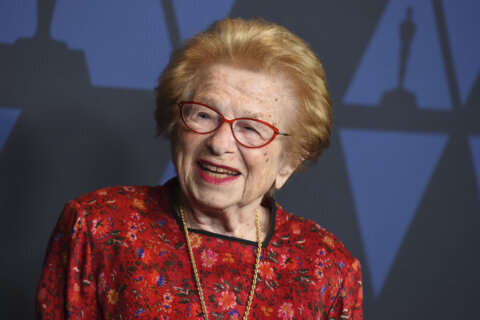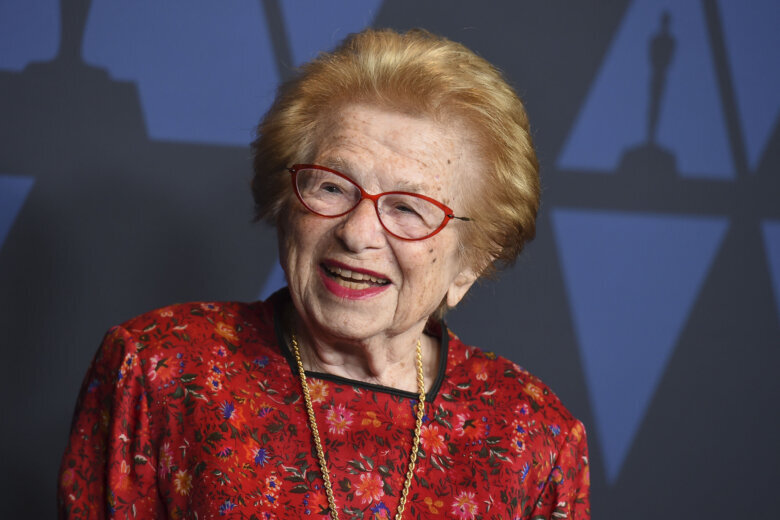
NEW YORK (AP) — Dr. Ruth Westheimer, the diminutive sex therapist who became a pop icon, media star and best-selling author through her frank talk about once-taboo bedroom topics, has died. She was 96.
Westheimer died on Friday at her home in New York City, surrounded by her family, according to publicist and friend Pierre Lehu.
Westheimer never advocated risky sexual behavior. Instead, she encouraged an open dialogue on previously closeted issues that affected her audience of millions. Her one recurring theme was there was nothing to be ashamed of.
“I still hold old-fashioned values and I’m a bit of a square,” she told students at Michigan City High School in 2002. “Sex is a private art and a private matter. But still, it is a subject we must talk about.”
Westheimer’s giggly, German-accented voice, coupled with her 4-foot-7 frame, made her an unlikely looking — and sounding — outlet for “sexual literacy.” The contradiction was one of the keys to her success.
But it was her extensive knowledge and training, coupled with her humorous, nonjudgmental manner, that catapulted her local radio program, “Sexually Speaking,” into the national spotlight in the early 1980s. She had an open approach to what two consenting adults did in the privacy of their home.
“Tell him you’re not going to initiate,” she told a concerned caller in June 1982. “Tell him that Dr. Westheimer said that you’re not going to die if he doesn’t have sex for one week.”
As a sign of her appeal across the generations and social culture, tributes came from actor-comedian Adam Sandler — “She always made us smile,” he wrote on X — to New York Gov. Kathy Hochul, who appointed Westheimer the state’s Ambassador of Loneliness. “May her memory be a blessing,” said the governor in a statement. ”She was brave, funny, candid and brilliant.”
Her radio success opened new doors, and in 1983 she wrote the first of more than 40 books: “Dr. Ruth’s Guide to Good Sex,” demystifying sex with both rationality and humor. There was even a board game, Dr. Ruth’s Game of Good Sex.
She soon became a regular on the late-night television talk-show circuit, bringing her personality to the national stage. Her rise coincided with the early days of the AIDS epidemic, when frank sexual talk became a necessity.
“If we could bring about talking about sexual activity the way we talk about diet — the way we talk about food — without it having this kind of connotation that there’s something not right about it, then we would be a step further. But we have to do it with good taste,” she told Johnny Carson in 1982.
She normalized the use of words like “penis” and “vagina” on radio and TV, aided by her Jewish grandmotherly accent, which The Wall Street Journal once said was “a cross between Henry Kissinger and Minnie Mouse.” People magazine included her in their list of “The Most Intriguing People of the Century.” She even made it into a Shania Twain song: “No, I don’t need proof to show me the truth/Not even Dr. Ruth is gonna tell me how I feel.”
Westheimer defended abortion rights, suggested older people have sex after a good night’s sleep and was an outspoken advocate of condom use. She believed in monogamy.
In the 1980s, she stood up for gay men at the height of the AIDS epidemic and spoke out loudly for the LGBTQ community. She said she defended people deemed by some far-right Christians to be “subhuman” because of her own past.
Born Karola Ruth Siegel in Frankfurt, Germany, in 1928, she was an only child. At 10, she was sent by her parents to Switzerland to escape Kristallnacht — the Nazis’ 1938 pogrom that served as a precursor to the Holocaust. She never saw her parents again; Westheimer believed they were killed in the gas chambers at Auschwitz.
At the age of 16, she moved to Palestine and joined the Haganah, the underground movement for Israeli independence. She was trained as a sniper, although she said she never shot at anyone.
Her legs were severely wounded when a bomb exploded in her dormitory, killing many of her friends. She said it was only through the work of a “superb” surgeon that she could walk and ski again.
She married her first husband, an Israeli soldier, in 1950, and they moved to Paris as she pursued an education. Although not a high school graduate, Westheimer was accepted into the Sorbonne to study psychology after passing an entrance exam.
The marriage ended in 1955; the next year, Westheimer went to New York with her new boyfriend, a Frenchman who became her second husband and father to her daughter, Miriam.
In 1961, after a second divorce, she finally met her life partner: Manfred Westheimer, a fellow refugee from Nazi Germany. The couple was married and had a son, Joel. They remained wed for 36 years until “Fred” — as she called him — died of heart failure in 1997.
After receiving her doctorate in education from Columbia University, she went on to teach at Lehman College in the Bronx. While there she developed a specialty — instructing professors how to teach sex education. It would eventually become the core of her curriculum.
“I soon realized that while I knew enough about education, I did not really know enough about sex,” she wrote in her 1987 autobiography. Westheimer then decided take classes with the renowned sex therapist, Dr. Helen Singer Kaplan.
It was there that she had discovered her calling. Soon, as she once said in a typically folksy comment, she was dispensing sexual advice “like good chicken soup.”
“I came from an Orthodox Jewish home so sex for us Jews was never considered a sin,” she told The Guardian in 2019.
In 1984, her radio program was nationally syndicated. A year later, she debuted in her own television program, “The Dr. Ruth Show,” which went on to win an Ace Award for excellence in cable television.
She also wrote a nationally syndicated advice column and later appeared in a line of videos produced by Playboy, preaching the virtues of open sexual discourse and good sex. She even had a series of calendars.
Her rise was noteworthy for the culture of the time, in which then-President Ronald Reagan’s administration was hostile to Planned Parenthood and aligned with pro-conservative voices.
Phyllis Schlafly, a staunch anti-feminist, wrote in a 1999 piece “The Dangers of Sex Education,” that Westheimer, as well as Gloria Steinem, Anita Hill, Madonna, Ellen DeGeneres and others were promoting “provocative sex chatter” and “rampant immorality.”
Father Edwin O’Brien, the director of communications for the Catholic archdiocese of New York who would go on to become a cardinal, called her work upsetting and morally compromised.
“It’s pure hedonism,” O’Brien wrote in a 1982 opinion published by The Wall Street Journal. “The message is just indulge yourself; whatever feels good is good. There is no higher law of overriding morality, and there’s also no responsibility.”
Westheimer made appearances on “The Howard Stern Radio Show,” “Nightline,” “The Tonight Show,” “The Ellen DeGeneres Show,” “The Dr. Oz Show” and “Late Night with David Letterman.” She played herself in episodes of “Quantum Leap” and “Love Boat: The Next Wave.”
Her books include “Sex for Dummies,” her autobiographical works “All in a Lifetime” (1987) and “Musically Speaking: A Life through Song” (2003). The documentary “Ask Dr. Ruth” aired in 2019.
During her time as a radio and television personality, she remained committed to teaching, with posts at Yale, Hunter, Princeton and Columbia universities and a busy college lecture schedule. She also maintained a private practice throughout her life.
Westheimer received an honorary doctorate from Hebrew Union College-Institute of Religion for her work in human sexuality and her commitment to the Jewish people, Israel and religion. In 2001 she received the Ellis Island Medal of Honor and the Leo Baeck Medal, and in 2004, she received the degree of Doctor of Letters, honoris causa, from Trinity College.
Ryan White, the director of “Ask Dr. Ruth,” told Vice in 2019 that Westheimer was never someone following trends. She was always an ally of gay rights and an advocate for family planning.
“She was at the forefront of both of those things throughout her entire life. I met her friends from her orphanage saying even when she met gay people throughout her life in the ’30s, ’40s, and ’50s she was always accepting of those people and always saying that people should be treated with respect.”
She is survived by two children, Joel and Miriam, and four grandchildren.
___
Mark Kennedy is at http://twitter.com/KennedyTwits
Copyright © 2024 The Associated Press. All rights reserved. This material may not be published, broadcast, written or redistributed.







